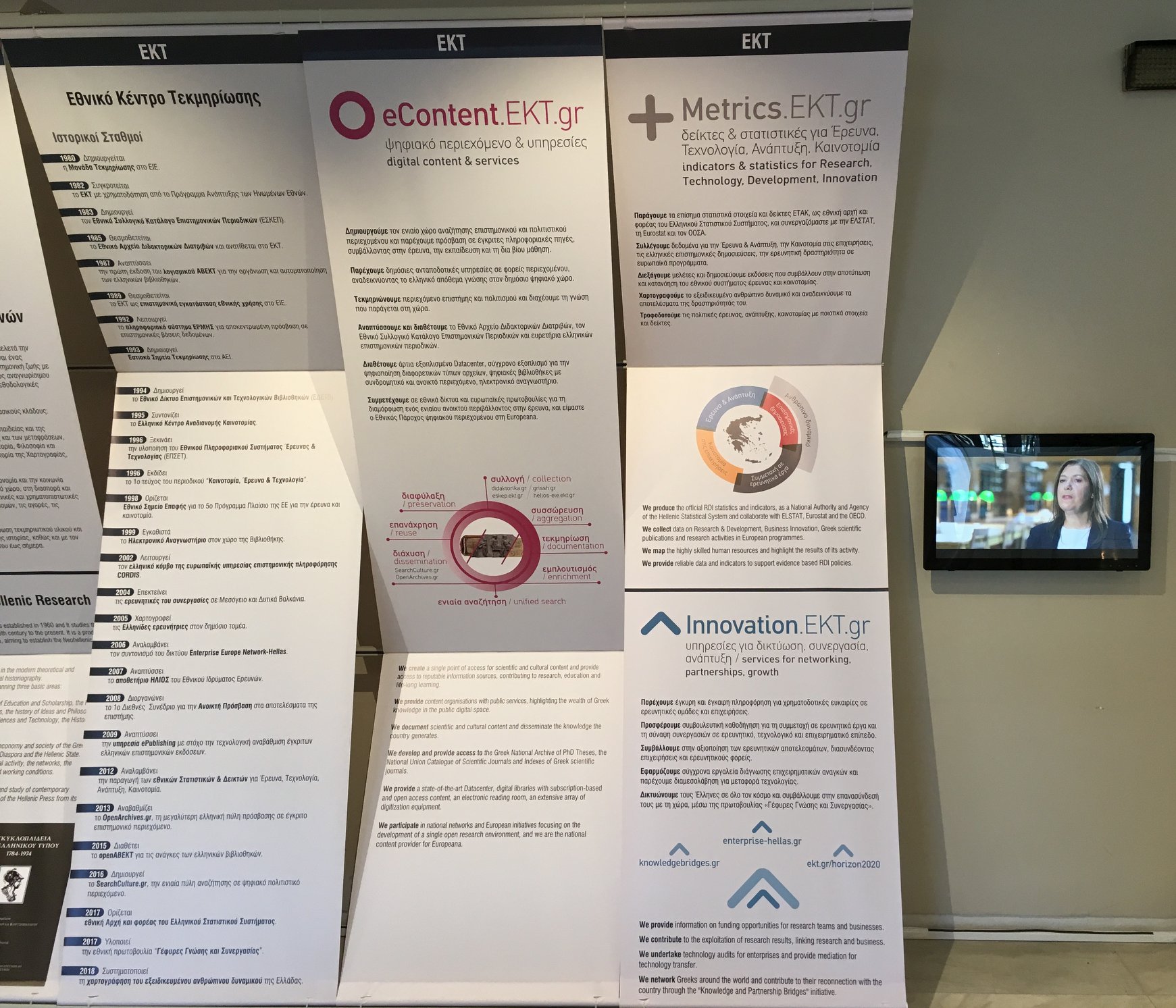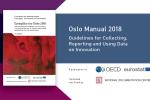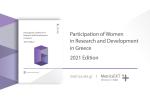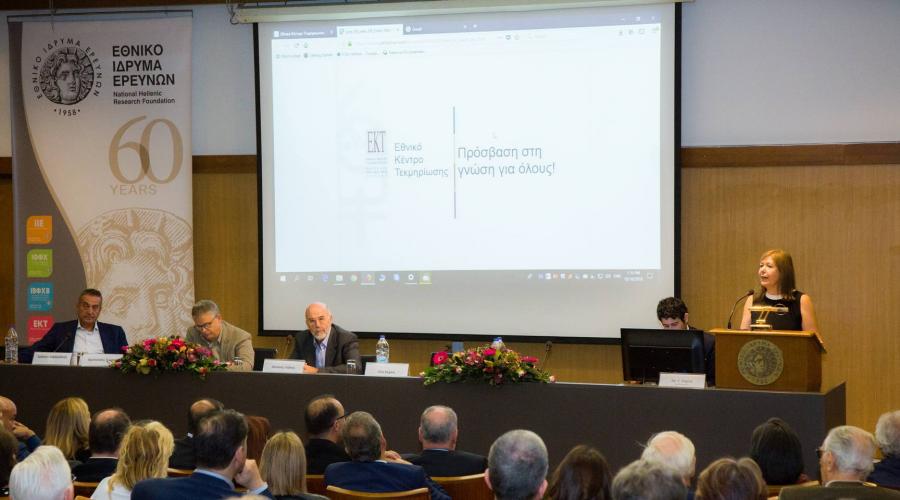
On Wednesday 10th October 2018, during the 60-year celebration held by the National Hellenic Research Foundation (NHRF), EKT presented the range of activities for the dissemination of knowledge, research & development indicators and entrepreneurship & networking. EKT partners and members of its network shared their experiences as partners and users of EKT’s services with the audience - members of the academic, research and business communities.
In the NHRF’s amphitheatre packed with researchers, scientists, entrepreneurs, students and honorary guests, the Director of EKT, Dr. Evi Sachini briefly outlined the course of EKT’s development since its launch and presented the 3 key pillars of activities. “EKT was established within the National Hellenic Research Foundation in 1980 and there were important reasons for its creation. At that time, the NHRF played a significant role in forming the country’s research policy. It had a library which served the entire research community of the country. The library was where the country’s knowledge output was organised and it acted as a central dissemination point. Clearly, EKT was established by the most appropriate and suitable organization”.
The Director’s speech was followed by a short presentation of EKT’s key pillars: eContent, which covers digital content and services as part of EKT’s role as the national digital scientific and cultural library; Metrics, which produces indicators and statistics for Research, Technology, Development, and Innovation, which provides services for networking, partnerships and development with the aim of connecting the country’s research and business communities and the reuse of research results.
As noted by E. Sachini, "Trying to disseminate the scientific output of the country in an organised manner is a very important job, and even more so when trying to capture and showcase the result of this work."
The three invited speakers were Antonis Liakos, Professor of History and Managing Editor of the Historein journal, Aristotelis Timbas, Professor of History of Science and Technology, president of EKT’s Scientific Board and Ioannis Karayiannis, Executive Chairman OLYMPIA group, Board of Directors SEV (Hellenic Federation of Enterprises).
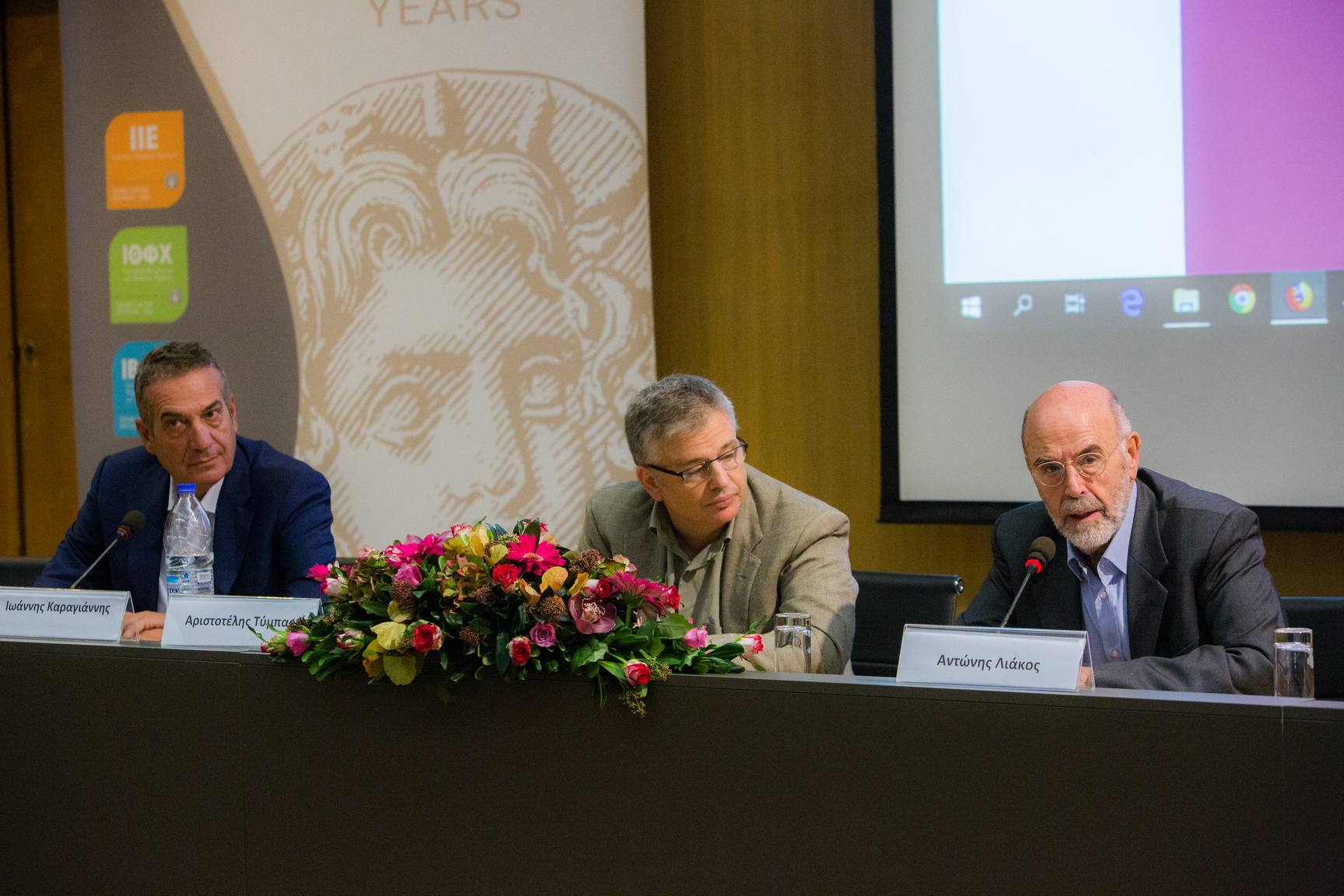
Antonis Liakos highlighted EKT’s contribution as national infrastructure for the dissemination of the country’s knowledge, saying, "The state needs to give EKT the support necessary to continue to do what it does, as a central science and research institution in Greece.’ Referring to EKT’s contribution to the organisation, documentation and distribution of digital scientific and cultural content, he stated. ‘EKT aims to network the entire knowledge output of Greece and has achieved this to a significant degree and with great effectiveness."
He also pointed out the invaluable contribution of EKT to the promotion of the country’s scientific journals via the services it provides to prestigious content providers. He highlighted the exceptional collaboration of EKT in the e-publication of the Historein journal through its ePublishing platform, and the possibilities for the journal’s international promotion the platform offers. He continued by referring to examples showcasing EKT’s contributions to open digital content, such as the Greek National Archive of PhD Theses, the e infrastructure providing national and international academia access to 40,000 PhD theses from Greek scientists, BIBLIONET, now available through EKT’s cloud infrastructure recording and monitoring all Greek publishing, the Repository of the Observatory of the Refugee and Migration Crisis in the Aegean, a noteworthy example of how major contemporary issues can become an open file which hosts not only officially produced documents but also the testimonies and opinions of people, and the e-platform MITIDA with its valuable material for educators.
Aristotelis Timbas pointed out that EKT is an institution critical to the public interest, serving Greek society and its institutions in the best way and as such must have the well-organised and continued support of the state. In his speech, he remarked that ‘the 40 years of EKT’s development coincided with 40 years of ICT development. Its agenda, therefore, has been determined by the changes technological developments have brought about in society. Over the past 7 years, it has met the great need to measure, record and document activities of the country’s specialised human resources in a very co-ordinated, organised and timely manner. And this is a valuable legacy for the exercise of public research, technology, science, development and private policies. EKT is very proud of this activity.
He made particular reference to the initiative ‘Knowledge and Partnership Bridges’ being implemented by EKT and which, through dedicated platforms, supports the potential to form virtual communities of researchers and scientists from around the world, allowing the creation of a virtual Greece of research, science and innovation. A Greece which transcends its borders and exploits new technologies, creating bridges between Greeks around the world enabling networking and collaboration.
In addition, he made reference to EKT’s development and maintenance of registers for human resources as well as different bodies connected to research, science and technology. ‘It is an institution of great value as it aims to operate as a tool for the exercise of public policy and to be a springboard for the forms of entrepreneurship specific to Greek society that can lead to a collective wellbeing.’
Lastly, he praised the steady progress and consistency shown by EKT, pointing out the 99 publications for research and innovation indicators, the 363 issues of its newsletter which has been sent regularly since 2002 and the 111 issues of ‘Innovation, Research & Technology’ periodical which has been published since 1996.
Ioannis Karayiannis, representing the business world, emphasised the invaluable advice EKT gives Greek businesses on understanding how important it is to invest in Research & Development and to exploit it for the benefit of the economy. Investments in Research & Development open up new job opportunities for the country’s research personnel, contributing in this way to the halting of the brain drain and its conversion into brain gain.
He stated that, "Greece has always had and continues to have very good scientists and universities. Why do we carry out research if Greek businesses cannot utilise it and become European and world champions? Without investment in Research & Development, the brain drain will continue. If investments are not made, all the outstanding scientists we have will continue to look for opportunities abroad. EKT has made me realise how important it is for every company to measure Research & Development. We’ve seen that we invest far less in Research & Development than our competitors. Statistics and a rational way to measure data for comparison with other countries enable an understanding of one’s position. If businesses invest in Research & Development, they will invest in new equipment, increase their sales and employ many young scientists. In our company, we have paid great attention to investment" .
He continued by saying, "This is something we at SEV believe must be done by more Greek industries. Research, development and innovation go hand in hand with business and investment. When there is a link between them, conditions for carrying out research into innovative industrial products that will be exported will help the country’s growth and employment, will slow the brain drain and will bring Greek scientists to the country to work. It is the duty of businesses to invest in Research & Development and use human resources to claim the position we deserve on the global chessboard".
The National Documentation Centre session concluded with E. Sachini’s special mention of the contribution of EKT personnel, which today numbers 130 highly skilled professionals from different scientific fields, to the progress of the organisation.
On the ground floor of the NHRF is a permanent exhibition of its history, the activities and achievements of its three institutions and EKT. Visitors can learn about the milestones in EKT’s history, browse its major publications on the Greek research and innovation ecosystem and the rich digital content aggregated and available with open access principles.









